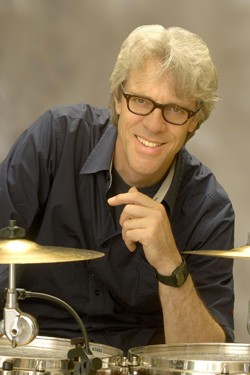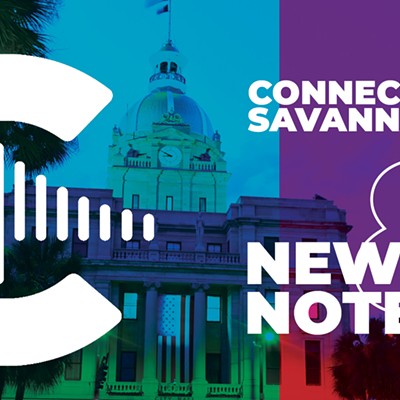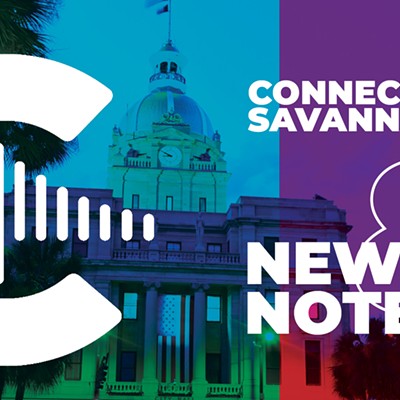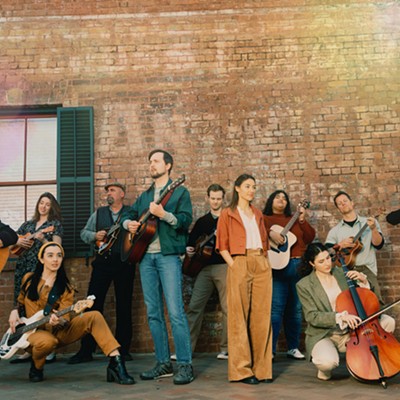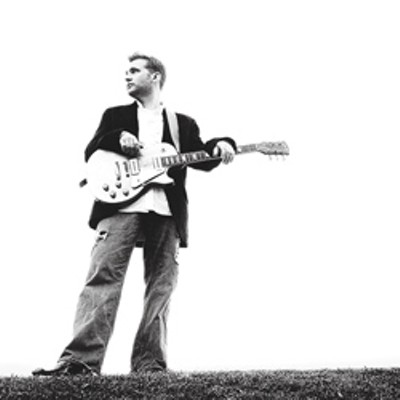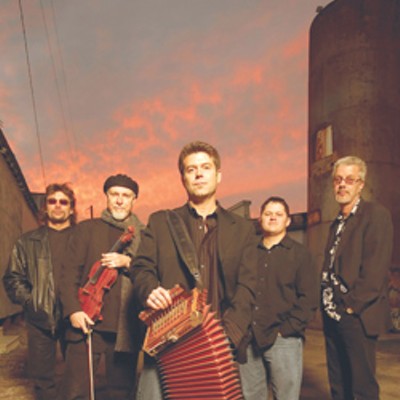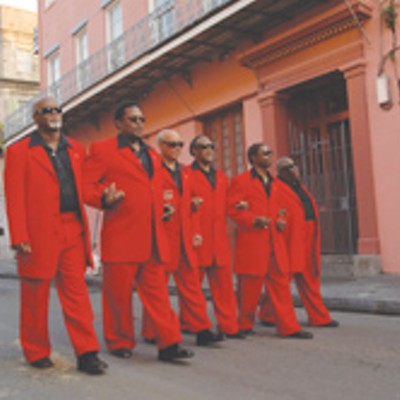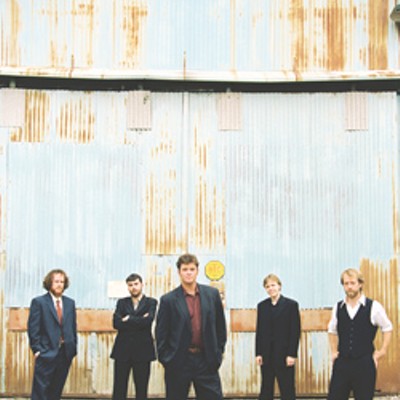When the Savannah Music Festival announced that The Police’s drummer Stewart Copeland was among the internationally-known musicians slated to appear at their 2008 event, it was widely perceived as a major booking. However, most folks know Copeland solely for his work with the aforementioned rock group that at one time was arguably the most famous and successful power trio in the world, and not for his other accomplishments, many of which seem more suited to this engagement.
Despite the fact that he and bandmates Sting and Andy Summers reunited last year for an ongoing (and massively successful) tour marking the 30th anniversary of the release of their groundbreaking debut single “Roxanne,” there’s always been more to this U.S. born renaissance man.
From the start of his career in The Police, Copeland always aspired to do more with music than merely pound the skins in a pop group (no matter how eclectic, influential or adored). To that end, over the past three decades, he’s scored numerous film and television projects, composed music for both ballet and opera, and been seen as a leading catalyst in the West’s acceptance of ethnic musics from across the globe.
It could be said that all facets of Copeland’s artistic output will be on display in this unique appearance which will include the premiere of a new composition for piano, violin and percussion, as well as material from his latest CD Orchestralli (played by a 17-piece ensemble), followed by a Q & A with the audience, and culminating in a rare theatrical screening of his acclaimed low-budget documentary film Everybody Stares: The Police Inside Out.
That 2006 film found Copeland crafting a fly-on-the-wall portrait of his famous group —from their earliest brushes with success to near the tumultuous end of their career— out of never-before-seen Super-8 movie footage shot decades ago by himself and the band’s associates. By presenting the bandmembers’ private and semi-private moments alongside breathtaking images of massive arena-sized crowds hanging on their every note, he subliminally goosed the will-they-or-won’t-they-ever reunite question which had dogged that band since their dissolution in the mid-‘80s.
A fast talker known for his strong opinions, quick wit and self-confidence (all of which serve as prime forces behind his fairly staggering accomplishments in a variety of pursuits), Copeland spoke to me from the West Coast where he was hard at work preparing for this special show.
First of all, you’re on a hiatus from the Police tour right now, but there’s still one leg to go after this, and I see you’ll be joined by Elvis Costello and The Attractions for those dates.
Stewart Copeland: Yes! You know, we were rivals back in the day, so it’ll be fun to duke it out every night onstage. We actually have a lot of mutual respect between us, but that doesn’t stop it from being a rivalry.
So, who do you have money on as far as putting on the better show?
Stewart Copeland: Are you kidding me? There aren’t enough Wheaties in the world for them to eat to even come close to catching up with us! But it always works well for us to have a strong opening act. The better they do, the better we’ll do.
Were you able to squeeze this Savannah date into an already existing break in the Police tour, or was that break scheduled around this premiere of your new work?
Stewart Copeland: Well, I don’t think either were scheduled around the other. Savannah was planned before the Police tour, and it just happened to be booked the way it was.
I understand you’re a close friend of SMF associate artistic director Daniel Hope, and that he’ll also be taking part in the new composition you’ll premiere here. How did you two meet, and how much of a role if any did Daniel have in bringing you to Savannah for this show?
Stewart Copeland: Yes. The new composition is for him. I mean, it’s actually about my little girl Celeste, but he commissioned the piece. Or rather, the festival did that for him. He and I have a mutual friend named Johnny Moore, who Savannahians will remember form his performance in The Soldier’s Tale a season or two ago. He’s an old friend of mine and he introduced me to Daniel Hope. At some point there was a German TV show called Into The Night, where they take two completely different people —like a painter and a poet or maybe a musician and a politician— and send them out on the town to explore one city or another. So, for one episode, I was Daniel’s host and showed him around the great haunts of Los Angeles. We already knew each other, so it was great fun. We went to my favorite little restaurant, and then to an art gallery which I would never have seen, but ti was highly recommended. Then we went to Disney Hall and then capped the evening with a visit to the Rainbow Grill.
For those who aren’t familiar with the Rainbow Grill, it used to be, and still is, the place in L.A. where any English rock bands travelling through seem to stop. It actually provides a very important service to the young, single women of Los Angeles who want to find themselves a British musician. Or really any young musician in tight pants who can fake a British accent. For the purposes of the show, we actually hired some actresses to come up and accost Daniel as though he was a famous rock star. (Laughs) He of course at the time was playing in a highly revered classical music group called the Beaux Arts Trio, so when they came up all excited and said “aren’t you in a band” he knew right away something was up. But I paid them a lot of money to scream “Beaux Arts Trio? You ROCK!”
Most folks obviously know you as a rock drummer, but you’ve been scoring film and television for years. I was wondering what first led you into such work, and if it was something you had long aspired to, or if it was more happenstance that you found you had an affinity for that type of work.
Stewart Copeland: It was happenstance. I got a phone call from Francis Ford Coppola. (Pregnant pause) I took the call. And he invited me down to Tulsa, Ok. where he was shooting a film called Rumblefish. I had never been on a movie set before and had no idea how movies were made, or really any idea what he wanted from me, but we talked a bit and developed a rapport. I don’t know if you’re aware of how Francis works, but his system for any project he’s involved in is that he finds talented people who are willing to work for him and then he sets them free. He just said, hey kid, you got talent, so you can make me a film score. He gave me a few pointers and set me loose. I had to reinvent the wheel for my own god-durn self, and that’s why people in the industry wound up calling that music innovative. Actually, it was just bone ignorant. However, if you don’t know where the box is, then it’s much easier to think out of the box! In fact, that’s our family motto: “Where’s the box?”
Looking over the list of projects you have composed soundtracks for, I was struck by the wide range of films and shows that have featured your music, but I found it difficult to discern any noticeable pattern with regard to the choices themselves.
Stewart Copeland: Well, you see there? You have indeed discerned a pattern.
What do you look for when choosing a project to score, or do you ever compose work independently of a film or show, which then winds up finding a home later on as part of a soundtrack?
Stewart Copeland: In any collaborative artistic enterprise, you often stab in this direction and if it doesn’t catch fire, then you stab in the opposite direction and wind up going there. The tangents that come up are sometime really great from a musical standpoint. Often, I’ll come up with way too much music for a given film or show. There just isn’t enough room for all the cues, or they would overwhelm the final product. Those extras sit there in my cookie jar and I tend to eventually turn a lot of those pieces into concert works.
Little information has been released about the type of piece you’ll be debuting here in Savannah, but I’ve been told it will include a 17-piece ensemble. What can folks who come to this recital expect from the live music portion of the show?
Stewart Copeland: Well, actually the rest of the evening will use that ensemble, but the specific new piece that is being debuted is just for piano and violin. However, as is usually the case, I’ll be hustled onstage to ruin the piece by playing drums alongside them. But, folks seem to love that so that’s what will happen. And, when I’m sitting there on stage I just can’t shut up, so I’ll also do some talking. It’s a bit of a schizophrenic scene.
Plenty of internal drama on display?
Stewart Copeland: Yes, some internal drama. Well, not that much. Just the typical situation of the composer guy being at loggerheads with the drummer guy. The problem is that we’re stuck with each other. I mean, here I wrote a beautiful, poignant piece of music that I feel has a certain degree of inner poetry and a discreet charm, and that all works wonderfully until I get behind the drums. I remember the plaintive voice of the composer saying, “Don’t fuck this up!” But the drummer guy can’t help himself, simply because it’s the drummer guy who has to face the music and sit there in front of the audience. However, it’s the composer guy who reads the reviews the next day. (Laughs) Actually, I just made up that last part to keep the simile going.
But, it’s quite true.
Stewart Copeland: You’re right. It’s the composer guy who gets the hangover. I think there was a Jim Carrey movie about all of this...
Is there any specific prior work of yours that would fit nicely alongside this new piece, or rather, is this a great stylistic departure from the types of compositions you are already known for?
Stewart Copeland: Well, yes, actually. The other pieces we’ll be playing fit nicely alongside it. I’ve discovered that writing for a small orchestra is my favorite medium. Actually, it’s all compromised. The most fun type of music to write is opera, but the world out there is such a cold, hard place for opera. That’s such a thankless task that writing for small orchestra is very esoteric. It’s high maintenance and low yield in most every regard other than the personal artistic joy you receive, but I do love it. Oddly enough, I have found that it’s actually much easier to write for a full orchestra. It costs less, and come s together more easily.
I’m surprised to hear that. One would assume it would be more expensive and more hassle to deal with a full-sized group.
Stewart Copeland: Well, here’s why: That orchestra is just sitting there. They have two regular rehearsals booked per week and they’re usually already playing a concert on the weekend. They’re just hanging together waiting to play some piece of music, and it could be Mozart or it could be Copeland. All I have to do is put some charts on the stand. However, for a small orchestra, I have to find 17 musicians who are all really good and fly them out of their hometowns and assemble a motley crew, so to speak. This will be sort of like a Stravinsky orchestra. I’ll have a first chair for every slot: three reeds, one of every size; three horns, one of every size; and four fiddles because they like it that way; plus one or two bangers and clatterers; a piano, bass and a few other bits and pieces. But it’s a containable unit.
Also, I can work stuff out with them more intimately. Some of these works are also charted out for full orchestra, which is a real buzz, because I love that scope as well. But the smaller orchestra is more malleable. It’s sort of like surfing on a small board rather than a big board. The big board has all the stately majesty, but the little board is more agile.
How exactly are the other pieces linked to the new one?
Stewart Copeland: Well, there’s the other three girls. Not all of them are for my daughters, but I’ve written for Eve and Grace, and girl number three is Celeste.
The SMF is known for staging a lot of one-time-only performances which are completely unique to their festival. Do you imagine you’ll have additional live performances of this particular work, or are we to assume this is a one-time only airing of the piece?
Stewart Copeland: Um, I don’t think it’ll be a one-time-only airing in any respect, actually. (Laughs) I don’t know if that is a good or a bad thing for Savannah. But I’m pretty much over doing things just once. I mean to put something like this together and expend all that energy for just one show? I don’t get it.
How much rehearsal is going into this show?
Stewart Copeland: Well, that’s one of the greatest things about this kind of music. For a rock band, you gotta rehearse for months. With this kind of stuff, I put the charts on the stands and count ‘em in, and we’re good to go. We’ve got two practice sessions, so we’ll rehearse for a couple of days. It’s pretty charted out. This is a pretty “unbaggable” type of music. It’s not classical at all. I’ll often get roped in with either the jazz section or the classical section because there is no guitar involved, but neither of those camps are comfortable for me. Call it “reggae orchestral.”
Is that what you’re now calling your style?
Stewart Copeland: Well, someone could call it that. You could call it that.
But would you be pleased if I did?
Stewart Copeland: Reggae orchestral. Hmmm. It’s growing on me. By lunchtime I’ll be like, “What the hell.”
This event also features a talk of some sort by you as well as a screening of your documentary film on the formative years of The Police, is that correct?
Stewart Copeland: That’s true. It actually evolved from one kind of thing to another, which is why it is now such a strange evening. It started out with me screening the film at this festival with a little chat and then Daniel said, “Why don’t you write me a violin piece?” Then he said, “Well, if you’re gonna be there, why don’t you play as well?” Then he said, “Well, maybe there are some other pieces you could add, too. Then give a talk and then run the movie.” So, there are three very disparate forms of entertainment involved. I’m quite sure those folks will be well sick of me by the end of the evening.
Is this your first time being billed as “An Evening With Stewart Copeland”?
Stewart Copeland: Yes. Well, I’ve played shows where it was just billed as “Stewart Copeland.”
But this sounds sort of like Masterpiece Theater. (laughs)
Stewart Copeland: It is just a hair pompous, but it’s a nice festival.
Have you been able to attend many of the public screenings of the documentary?
Stewart Copeland: Yeah, yeah, yeah. That’s where this came from: screenings of the film at festivals where I do a little Q and A before or after or both. I really enjoy those. In this case, It’ll probably be more of a Q and A about my current notorious band that’s on the road now — and believe me, I have all sorts of dirt on those guys!
Do you say the Q and A will focus more on The Police because that’s what you plan on talking about, or you just assume that’s what most people will ask about?
Stewart Copeland: Well, people aren’t necessarily holding their breath for my Orchestralli music, you know? The Police tour is what’s on people’s minds right now. However, whatever they want to ask is fine with me. My life is an open book. I’ve got war stories on pretty much any topic you can imagine.
Did the other members of The Police have an opportunity to see the film before it was first shown to the public?
Stewart Copeland: Yes. Andy loved it, and Sting declined his opportunity. He doesn’t like to watch himself. He claims to have still not seen it, and at first I thought he just hated it and wanted to get out of telling me, but now I believe him, because he is allergic to watching coverage of himself. Andy loves it because he’s the star of the film. He came to Sundance and the little bastard got a standing ovation!
Well, he certainly is the “Chaplin figure” of the movie in a way.
Stewart Copeland: Yes, definitely.
In retrospect, do you feel the creation of that film played any role in helping to spur the subsequent reunion of the band?
Stewart Copeland: I think so, yes. Sting insists of course that he just woke up one morning and thought of it, but I can’t help but think the response to my film was on his mind that morning. Now, the following is all speculation — because remember, it’s all about Sting waking up one morning, right? See, Andy and I had pretty much forgotten about it. That was eight years out of our life about 25 years ago, and we’ve all lived a lot of life since then. The Police were on my mind because I’d just done a year promoting this film, but to me, when I thought of The Police, it was as a completely inert fossil.
Since this film was all shot from inside the band as opposed to outside of it, it had a very unique point of view when compared to any other films about rock bands. In my film, the fans are actually screaming and shouting down the lens of the camera. In other words, it was about The Police, but the result was that it surprised a lot of people by exposing just how much interest there still was in the group.
Over the years, I tended to hear a lot of nice things about the band. People tell me all the time how much our music means to them, but it actually had very little meaning to me anymore. Those were just trophies on a shelf. However, you have to imagine that Sting’s life is such that it just dictates he’s been surrounded by people who constantly tell him, “I’m glad you got rid of those other guys.” He just doesn’t hear a lot of good words about Andy and myself. I mean, you can just imagine that in “The Court of Magic Stingdom” one does not advance one’s position by going on about The Police. By the way, all the weird shit you’ve ever heard about Sting, about how odd he is in real life? As his friend, I can categorically confirm all of it.
Ah, I saw that one coming.
Stewart Copeland: (Laughs) It’s true, though. He is a weird individual. But he’s a true rock star. That part’s completely real. It’s not just on account of the unbelievable amount of music that just pours out of his every pore, but because of his very nature. He is simply not like other men.
Obviously, this film came directly out of your own personal experience, as you had shot most of the footage for your own private enjoyment. Now that you’ve been through the process of actually turning that footage into a cohesive and well-received documentary, do you have any desire to make another film for public release that is unrelated to your own personal life?
Stewart Copeland: Yes. I haven’t come up with a topic yet, but I really enjoyed making that film, and now, pretty much, I can afford to do more of it.
Have you ever visited Savannah before?
Stewart Copeland: I’m sure I have. I’ve been to Charleston, and whenever I think of Savannah I may be confusing it in my mind with Charleston. They both have those glorious white-columned homes and all that Southern Antebellum charm. And the trees. My family’s from the South. Actually I was born in Virginia, which Georgians might not consider the South, but I do. Now, my father is from Alabama, and that’s South!
For folks who have never knowingly been exposed to any of your music outside of The Police, is there any one album that you would suggest as an ideal introduction to your own solo compositions?
Stewart Copeland: Well, there are good ones out there, but the most relevant one would be the most recent one. I mean, the Rumblefish soundtrack got all the mainstream attention, so by all means look into that. But that’s not what I’m doing now. Orchestralli is the one I’ll be playing some from in Savannah, and I recently got a Grammy nomination for a piece I recorded in Europe. So, check out Orchestralli on iTunes.
You know, seeing Everybody Stares, it reminded me that I have some old super-8 footage of you shot by my friends in a new wave band called The Swimming Pool Q’s.
Stewart Copeland: Oh yeah! The Swimming Pool Q’s. Good band.
They toured as an opening act for you guys back on what must have been your first or second tour of America. They took some great shots of both bands clowning around at sound checks and offstage. Do you remember much at all about The Q’s?
Stewart Copeland: They were a nice group. For some reason, I think of them alongside The B-52’s. They were around at the same time, I believe, and then R.E.M. came a little later. But The Pool Q’s and the B-52’s were the sound of Georgia. Weren’t they from Macon?
No, they’re from Atlanta, but often got lumped into the Athens scene, which is where the B-52’s were formed.
Stewart Copeland: That’s right. Athens, Ga., the Manchester of the South. I remember The Swimming Pool Q’s as sounding a little like The B-52’s.
They had a similar attack, but were much more musically savvy.
Stewart Copeland: Yes. Less charisma, but more music. They were not one of the hostile, punk type bands. I recall they had at least as much humor as angst. They were great fun to play with.
What: An Evening With Stewart Copeland
Where: Trustees Theater
When: 8 pm, March 26
Cost: $45 - $15 at www.savannahmusicfestival.org or by calling 525-5050.
Info: www.stewartcopeland.net

